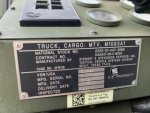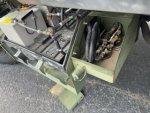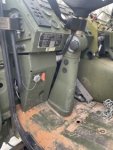- 319
- 236
- 43
- Location
- Myakka City, FL
Hello! I tried searching this and found no content as to the Disconnect Switches for the A1/ I do have wiring diagrams and that is substantial but I am looking for personal touch that you mechanics have had. I know the flaws that go with these units and know that some of you fellows do too. Recently this unit was involved with high water rescue from Hurricane Ian and now can't even be switched on to get the lights on the dash to come on. I have charged and checked the batteries. I have tested power across the Manual Disconnect Switch and it works on both 12vdc and 24vdc with no voltage drop/ The electrical master switch turns on but drops the power across the leads by 5vdc on the 24 side and 3vdc on the 12 side. I realize I have a problem with those because the batteries are showing no significant drop. I checked voltage at the Power Distribution Panel and found 4 vdc. Does the Polarity Box get bothered by water? This is an introduction and I can answer questions to what I have found/ I appreciate the assistance. Lugnuts






